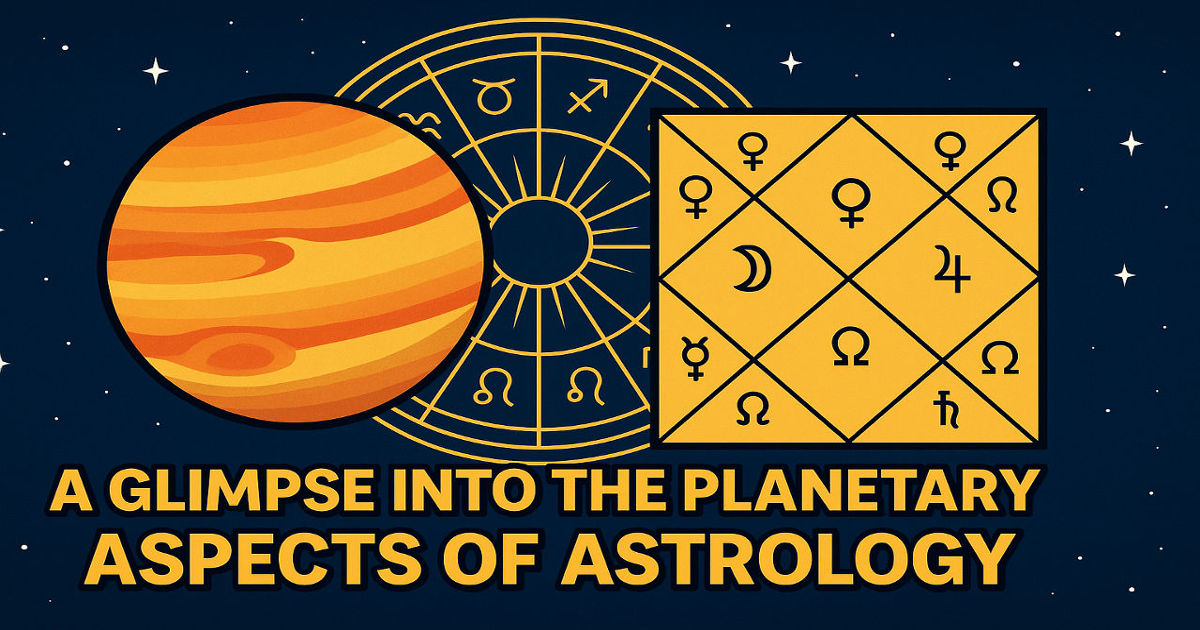
A glimpse into the planetary aspects of astrology
How to know if a planet is aspecting a house?
Today, we are taking A glimpse into the planetary aspects of astrology—the angles planets form with each other in your birth chart. In simple terms, an “aspect” is the distance between two planets on a 360-degree circle, and it shows whether their energies cooperate, compete, or pull you in different directions. Have you ever felt confident in one area of life but strangely blocked in another? Or wondered why two people with the same zodiac sign can behave so differently? Planetary aspects explain the “connections” inside the chart, so you read your horoscope like a living network, not a set of isolated planets.
Most people start with five major patterns because they show up everywhere: conjunction (together and blended), sextile (support that opens doors when you try), square (pressure that pushes growth), trine (natural ease and talent), and opposition (two ends that demand balance). Are easy aspects always lucky, and are hard aspects always negative? Not at all—trines can make you lazy, while squares can build discipline and courage. Which one do you relate to more: smooth progress that happens naturally, or challenges that force you to develop a stronger mindset and better habits?
To use planetary aspects of astrology in a practical way, start with the pairs that shape daily life. Check the Sun and Moon first: do your goals and feelings move together, or do they clash? Then look at Mercury for communication, Venus for love and values, and Mars for action and anger—do you speak calmly but react strongly, or act quickly and regret later? Next, observe Jupiter and Saturn to understand expansion versus responsibility. Which aspect pattern repeats across several planets, and where do you feel it most—career choices, relationships, confidence, or health routines? When you can name the pattern, you can manage it, and that is the real value of understanding planetary aspects.
Hindi Transcript (हिंदी प्रतिलेख)
आज हम ज्योतिष के ग्रहीय पहलुओं पर एक नज़र डालेंगे-आपकी जन्म कुंडली में ग्रह एक-दूसरे के साथ जो , कोण बनाते हैं। सरल शब्दों में, "पहलू" 360 डिग्री के वृत्त पर दो ग्रहों के बीच की दूरी है, और यह दर्शाता है कि उनकी ऊर्जाएँ सहयोग करती हैं, प्रतिस्पर्धा करती हैं, या आपको अलग-अलग दिशाओं में खींचती हैं। क्या आपने कभी जीवन के एक क्षेत्रमें आत्मविश्वास महसूस कियाहै, लेकिन दूसरे क्षेत्र में अजीब तरह से अवरुद्ध महसूस किया है? या सोचा है कि एक ही राशि के दो लोग इतना अलग व्यवहार क्यों करते हैं? ग्रहीय पहलू कुंडली के भीतर "संबंधों" को समझाते हैं, इसलिए आप अपनी कुंडली को अलग-थलग ग्रहों के समूह के बजाय एक जीवंत नेटवर्क की तरह पढ़ते हैं। अधिकांश लोग पाँच प्रमुख पैटर्न से शुरुआत करते हैं क्योंकि वे हर जगह दिखाई देते हैं: संयोजन (एक साथ और मिश्रित), षट्कोण (सहयोग जो आपके प्रयासों में द्वार खोलता है), वर्ग (दबाव जो विकास को बढ़ावा देता है), त्रिकोण (स्वाभाविक सहजता और प्रतिभा), और विरोध (दो छोर जो संतुलन की मांग करते हैं)। क्या आसान पहलू हमेशा भाग्यशाली होते हैं, और क्या कठिन पहलू हमेशा नकारात्मक होते हैं? बिल्कुल नहीं-त्रिकोण आपको आलसी बना सकते हैं, जबकि वर्ग अनुशासन और साहस का निर्माण कर सकते हैं। आप इनमें से किससे अधिक जुड़ाव महसूस करते हैं: सहज प्रगति जो स्वाभाविक रूप से होती है, या चुनौतियाँ जो आपको एक मजबूत मानसिकता और बेहतर आदतें विकसित करने के लिए मजबूर करती हैं? ज्योतिष के ग्रहों के पहलुओं का व्यावहारिक रूप से उपयोग करने के लिए, उन युग्मों से शुरुआत करें जो आपके दैनिक जीवन को प्रभावित करते हैं। सबसे पहले सूर्य और चंद्रमा को देखें: क्या आपके लक्ष्य और भावनाएँ एक साथ चलती हैं, या उनमें टकराव होता है? फिर संचार के लिए बुध, प्रेम और मूल्यों के लिए शुक्र, और क्रिया और क्रोध के लिए मंगल को देखें-क्या आप शांत होकर बोलते हैं लेकिन तीव्र प्रतिक्रिया देतेहैं, या जल्दबाजी में कार्य करते हैं और बाद में पछताते हैं? इसके बाद, विस्तार बनाम जिम्मेदारी को समझने के लिए बृहस्पति और शनि का अवलोकन करें। कौन सा पहलू पैटर्न कई ग्रहोंमें दोहराया जाताहै,और आपइसे सबसेअधिक कहाँ महसूस करतेहैं-करियरके चुनाव, रिश्ते, आत्मविश्वास, या स्वास्थ्य संबंधी दिनचर्या? जब आप पैटर्न को पहचान लेते हैं, तो आप उसे नियंत्रित कर सकते हैं, और यही ग्रहों के पहलुओं को समझने का वास्तविक मूल्य है।